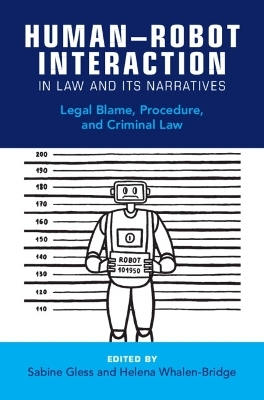
Human–Robot Interaction in Law and Its Narratives
Cambridge University Press (Verlag)
978-1-009-43150-7 (ISBN)
Robots are with us, but law and legal systems are not ready. This book identifies the issues posed by human-robot interactions in substantive law, procedural law, and law's narratives, and suggests how to address them. When human-robot interaction results in harm, who or what is responsible? Part I addresses substantive law, including the issues raised by attempts to impose criminal liability on different actors. And when robots perceive aspects of an alleged crime, can they be called as a sort of witness? Part II addresses procedural issues raised by human-robot interactions, including evidentiary problems arising out of data generated by robots monitoring humans, and issues of reliability and privacy. Beyond the standard fare of substantive and procedural law, and in view of the conceptual quandaries posed by robots, Part III offers chapters on narrative and rhetoric, suggesting different ways to understand human-robot interactions, and how to develop coherent frameworks to do that. This title is also available as Open Access on Cambridge Core.
Sabine Gless is Professor of Criminal Law at the University of Basel, Switzerland. Her research focuses on criminal justice issues related to the digitization of our living environment as well as on human rights in transnational criminal law. She is a member of editorial boards of various journals and serves as a delegate in science funding committees, including the German Research Foundation and the Leibniz Senate Evaluation Committee. Helena Whalen-Bridge is Associate Professor at the Faculty of Law, National University of Singapore. A recipient of multiple competitive research grants, her research interests include legal ethics and access to justice, legal narrative, and legal education. Her research in narrative was awarded the 2019 Teresa Godwin Phelps Award for Scholarship in Legal Communication, and she is the recipient of NUS Teaching Excellence Awards.
Introduction; Part I. Human–Robot Interactions and Substantive Law; 1. The Challenges of Human–Robot Interaction for Substantive Criminal Law: Mapping the Field Tatjana Hörnle; 2. Are Programmers in or out of Control? The Individual Criminal Responsibility of Programmers of Autonomous Weapons and Self-Driving Cars Marta Bo; 3. Trusting Robots – Limiting Due Diligence Obligations in Robot-Assisted Surgery under Swiss Criminal Law Janneke de Snaijer; 4. Forms of Robot Liability: Criminal Robots and Corporate Criminal Responsibility Thomas Weigend; Part II. Human–Robot Interactions and Procedural Law; 5. Introduction to Human–Robot Interaction and Procedural Issues in Criminal Justice Sabine Gless; 6. Human Psychology and Robot Evidence in the Courtroom, Alternative Dispute Resolution, and Agency Proceedings Sara Sun Beale and Hayley Lawrence; 7. Principles to Govern Regulation of Digital and Machine Evidence Andrea Roth; 8. Robot Testimony? A Taxonomy and Standardized Approach to the Use of Evaluative Data in Criminal Proceedings Emily Silverman, Sabine Gless and Jörg Arnold; 9. Digital Evidence Generated by Consumer Products: The Defense Perspective Erin Murphy; 10. Data as Evidence in Criminal Courts: Comparing Legal Frameworks and Actual Practices Bart Custers and Lonneke Stevens; 11. Reconsidering Two United States Constitutional Doctrines: Fourth Amendment Standing and the State Agency Requirement in a World of Robots David Gray; Part III. Human-Robot Interactions and Legal Narrative; 12. Narrative Approaches to Human–Robot Interaction and the Law Helena Whalen-Bridge; 13. The Case of the 'Stupid' Robot Frode Helmich Pedersen; 14. Inevitable or Not? Narrative Arguments Regarding Autonomous Vehicles in Singapore Helena Whalen-Bridge; 15. 'The knowledge of causes and the secret motions of things': The Interdisciplinary and Doctrinal Challenges of Automated Driving Systems and Criminal Law Jeanne Gaakeer.
| Erscheinungsdatum | 01.06.2024 |
|---|---|
| Zusatzinfo | Worked examples or Exercises |
| Verlagsort | Cambridge |
| Sprache | englisch |
| Gewicht | 722 g |
| Themenwelt | Informatik ► Theorie / Studium ► Künstliche Intelligenz / Robotik |
| Recht / Steuern ► EU / Internationales Recht | |
| Recht / Steuern ► Privatrecht / Bürgerliches Recht ► Zivilverfahrensrecht | |
| Recht / Steuern ► Strafrecht | |
| ISBN-10 | 1-009-43150-1 / 1009431501 |
| ISBN-13 | 978-1-009-43150-7 / 9781009431507 |
| Zustand | Neuware |
| Informationen gemäß Produktsicherheitsverordnung (GPSR) | |
| Haben Sie eine Frage zum Produkt? |
aus dem Bereich


